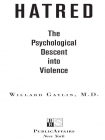Hatred, Willard Gaylin [best ebook for manga txt] 📗

- Author: Willard Gaylin
Book online «Hatred, Willard Gaylin [best ebook for manga txt] 📗». Author Willard Gaylin
The psychopath seeks opportunities to exercise his wanton cruelty and hatred. He pursues official activities that allow or call for the torture or humiliation of others. It is only the power of authority—sometimes a cult leader, but more disastrously, the state or organized religion—that can offer the psychopath a “legitimate” outlet for his unnatural impulses. The Birmingham, Alabama, bombers were likely psychopaths sanctioned by the perhaps less psychopathic characters of their racist colleagues, who applauded their behavior and protected them from early apprehension. The Germans—and the Lithuanians and Ukrainians—who volunteered to serve in the Nazi death camps were the counterparts of the street thugs who live by crime, and a great percentage of them were clearly psychopaths. One has to assume that they did not represent an authentic sample of those pressed into service by the Germans. But the Nazi Party did recruit a population of active psychopathic Jew haters into such legitimate state entities as the SS Einsatzgruppen, the killing corps that preceded the more efficient gas furnaces.
Some early students of human behavior perceived a human being as merely a sophisticated form of animal that, like the lower animals, is driven exclusively by hedonistic principles, that is, the desire to avoid pain and seek pleasure. The psychopath certainly operates in this manner, but he is not a normal human being.
Psychopathy is a developmental defect. We must not honor psychopathic behavior by seeing it as a natural extension of human drives. Most human beings are not driven exclusively by appetite and selfishness. We have ample evidence that survival and pleasure are decidedly not the only forces motivating humankind. A better case can be made for the potential within all of us for self-sacrificing actions.
Danger is great in times of war and disaster, yet acts of incredible courage are particularly manifest in these very situations. What motivates the soldier who hurls his body onto a grenade to save his comrades; the fireman who enters a blazing building to save a child; the captain who goes down with his ship after evacuating his passengers and crew? To explain such phenomena requires a more complex view of the human being than that of a survival-driven machine. In that great American classic, The Red Badge of Courage, the young nameless hero who had previously abandoned his comrades and fled the field of battle discovered courage:
He suddenly lost concern for himself, and forgot to look at a menacing fate. He became not a man but a member. He felt that something of which he was a part—a regiment, an army, a cause, or a country—was in a crisis. He was welded into a common personality which was dominated by a single desire. For moments he could not flee no more than a little finger can commit a revolution from a hand.46
For most people, inborn beliefs shape conduct, and ideals like courage, generosity, honor, pride, patriotism, responsibility, charity, compassion, and empathy set standards for behavior. We do not always have the courage or strength to achieve our ideals, but when we abandon them, our conscience inflicts its toll for cowardice or weakness. Failing our internal principles produces the emotions of guilt and shame. These are as powerful elements in shaping normal human behavior as fear and rage; some would say they have greater motivating force. The agonies of guilt and shame make us pay a severe price for failing our ego ideal and perhaps prepare us for doing better in the future—that is, if we experience these emotions and if we perceive a future. The psychopath is capable of neither.
Characteristically, the psychopath is incapable of feeling either shame or guilt. He feels no contrition. Compounding this is a distorted sense of the future. He really may be perceived as denying the future. The psychopath grandiosely assumes that he will prevail without facing any punishment for his actions. Since it is only the present that he comprehends, he lives almost exclusively in the here and now, grabbing for instant gratification. Devoid of conscience, absent the emotions of guilt and shame, he pursues his own interests exclusively. The psychopath, driven by his personal survival needs, is motivated by the only emotions that operate within him: lust, greed, fear, and rage. He is effectively operating with the consciousness, and under the rules, that guide animal behavior. But he does not have the instinctual apparatus supplied to animals as an alternative to conscience. He will do that which higher primates would not, destroy children and the helpless, under the constricting influences of instinct.
While the psychopath can join a group, he has no capacity to identify with a larger group and feels no common purpose unless that purpose is the shared privilege of venting one’s hatred. The psychopath uses such groups only opportunistically. In the blood sport of killing, he may temporarily find an exhilarating sense of the power of the group. After the lynching, the mob will dissipate and deconstruct into its isolated and disparate individuals like the spent pieces of an old jigsaw puzzle. The psychopath certainly cannot identify with any principle or ideal that involves others except for hatred.
Explanations of the cause of psychopathy have undergone radical shifts over the centuries. In the nineteenth century, Richard L. Dugdale proposed that psychopathy was hereditary, coining the term “hereditary psychopath.” The two words became so intertwined that the term “psychopath” was eventually abandoned by many once Dugdale’s work was refuted. “Sociopath” was substituted. Unfortunately, Dugdale, the eugenics movement, and the use of eugenics to support Nazi racial theories were the final nails in the coffin, making any legitimate examination of genetic influences on behavior





Comments (0)